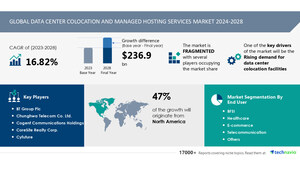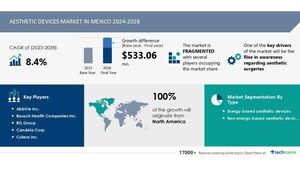NEW YORK, Oct. 8, 2024 /PRNewswire/ -- Report on how AI is driving market transformation - The Coronavirus Test Kits Market in APAC size is estimated to grow by USD 2.87 billion from 2024-2028, according to Technavio. The market is estimated to grow at a CAGR of over 72.2% during the forecast period. Rise in availability of various types of test kits in APAC is driving market growth, with a trend towards advancements in technology to develop rapid and accurate test kits. However, shortage of testing kits and lack of laboratory infrastructure in developing countries poses a challenge - Key market players include 3D Biomedicine Science and Technology Co. Ltd., Abbott Laboratories, altona Diagnostics GmbH, BGI Group, Bio Rad Laboratories Inc., CAMTECH DIAGNOSTICS, Co Diagnostics Inc, Danaher Corp., Denka Co. Ltd., Edinburgh Genetics Ltd., F. Hoffmann La Roche Ltd., Genes2Me Pvt. Ltd., Guangzhou Wondfo Biotech Co. Ltd., Hologic Inc., JN Medsys Pte. Ltd., KogeneBiotech, Kurabo Industries Ltd., Maccura Biotechnology Co. Ltd, Mylab Discovery Solutions Pvt Ltd., QIAGEN N.V., Sd Biosensor Inc., Seegene Inc., SolGent Co. Ltd., Sysmex Corp., Tata Sons Pvt. Ltd., and Thermo Fisher Scientific Inc..
Key insights into market evolution with AI-powered analysis. Explore trends, segmentation, and growth drivers- View the snapshot of this report
Coronavirus Test Kits Market In APAC Scope |
|
Report Coverage |
Details |
Base year |
2023 |
Historic period |
2018 - 2022 |
Forecast period |
2024-2028 |
Growth momentum & CAGR |
Decelerate at a CAGR of -72.2% |
Market growth 2024-2028 |
USD -2879.2 million |
Market structure |
Fragmented |
YoY growth 2022-2023 (%) |
-88.9 |
Regional analysis |
APAC |
Performing market contribution |
APAC at 100% |
Key countries |
India, China, Japan, South Korea, and Rest of APAC |
Key companies profiled |
3D Biomedicine Science and Technology Co. Ltd., Abbott Laboratories, altona Diagnostics GmbH, BGI Group, Bio Rad Laboratories Inc., CAMTECH DIAGNOSTICS, Co Diagnostics Inc, Danaher Corp., Denka Co. Ltd., Edinburgh Genetics Ltd., F. Hoffmann La Roche Ltd., Genes2Me Pvt. Ltd., Guangzhou Wondfo Biotech Co. Ltd., Hologic Inc., JN Medsys Pte. Ltd., KogeneBiotech, Kurabo Industries Ltd., Maccura Biotechnology Co. Ltd, Mylab Discovery Solutions Pvt Ltd., QIAGEN N.V., Sd Biosensor Inc., Seegene Inc., SolGent Co. Ltd., Sysmex Corp., Tata Sons Pvt. Ltd., and Thermo Fisher Scientific Inc. |
Market Driver
The APAC region has experienced notable progress in coronavirus test kit technology, particularly in the production of swift and precise test kits. One significant advancement is the emergence of rapid antigen test kits, which identify coronavirus proteins through nasal or throat swabs, delivering results in minutes. This stands in contrast to traditional PCR tests, which necessitate lab processing and extended wait times for results. Rapid antigen test kits have become indispensable tools for healthcare professionals, facilitating the swift identification of coronavirus infections. Another technological advancement is the integration of AI and ML algorithms to interpret test results. These technologies can analyze test data and generate precise results in seconds, minimizing human error and ensuring a more dependable diagnosis. For instance, AI algorithms can analyze chest X-rays to detect pneumonia indicators linked to the coronavirus, aiding in early detection and treatment. Moreover, the advent of portable and user-friendly test kits has revolutionized the coronavirus test kits market in APAC. These kits enable individuals to self-test and monitor their health at home or in remote locations, enhancing overall testing capacity and accuracy. Some portable test kits even link to smartphones, allowing users to effortlessly access and share test results with healthcare professionals. These advantages have expanded testing accessibility and reliability in the APAC region, paving the way for early detection and prompt intervention. Therefore, these factors are anticipated to fuel the expansion of the coronavirus test kits market in APAC during the forecast period.
The Coronavirus test kits market is experiencing significant growth due to the health benefits they provide in identifying COVID-19 cases. The market dynamics include various test types, such as molecular and serological, with different sample types like swab and blood. Hospitals and healthcare organizations are key consumers, with regulatory frameworks ensuring test accuracy and safety. Testing costs and sensitivity analysis are crucial factors, with false-positives and false-negatives impacting clinical events and infection fatality rates. Rapid testing is essential for public health, especially in hospitals and ICUs, where accurate diagnosis is vital. Serological tests detect antibodies, providing insights into infection history and immunity. Global market trends include mass testing, personal protective measures, and the integration of epidemiological data for effective reproduction number analysis. Health economics and consumer perspective play a role in testing frequency, with false negatives/positives affecting quality-adjusted life years. Vaccination and regulatory frameworks continue to evolve, shaping the market landscape.
Request Sample of our comprehensive report now to stay ahead in the AI-driven market evolution!
Market Challenges
- The coronavirus pandemic has resulted in a significant increase in the demand for COVID-19 testing kits in APAC countries. However, several nations, including India, Australia, and Japan, are facing a shortage of testing kits due to the high infection rate and the challenges in importing kits from abroad. The import of testing kits has been affected by travel bans and flight restrictions. In response, some countries, such as Australia, have turned to local universities for help in producing testing kits. Japan also reported a shortage of test kits in February 2020. The imbalance between supply and demand in the market will negatively impact the growth of the coronavirus test kits market in APAC during the forecast period. In addition, infrastructural concerns in fast-growing economies like India and China are hindering the efficient production and distribution of testing kits. The lack of laboratory infrastructure and the shortage of testing kits will continue to pose challenges for the market.
- The Coronavirus test kits market is experiencing significant growth due to the ongoing pandemic. Health benefits of timely diagnosis are undeniable, but challenges persist. Testing costs vary, and sensitivity analysis is crucial for accurate clinical events identification. Infection fatality rates and diagnosis methods, such as molecular testing and serological testing, require consideration. Specimen collection methods, including swab tests and blood tests, impact testing efficiency. Hospitals and healthcare organizations navigate regulatory frameworks for rapid testing, dealing with inaccuracies like false-positives and false-negatives. Global market dynamics are influenced by consumer perspective, testing frequency, and public health initiatives like mass testing and vaccination. Effective reproduction numbers depend on quality-adjusted life years, infection chain management, and personal protective measures. Health economics must balance testing costs with potential intensive care unit admissions and deaths.
Discover how AI is revolutionizing market trends- Get your access now!
Segment Overview
This coronavirus test kits market in APAC report extensively covers market segmentation by
- End-user
- 1.1 Government
- 1.2 Non-government
- Type
- 2.1 Rapid test kit
- 2.2 RT-PCR
- 2.3 Others
- Geography
- 3.1 APAC
1.1 Government- The government segment dominates the coronavirus test kits market in APAC due to increased investments by government organizations in the development of new rapid testing kits and initiatives to accelerate COVID-19 testing. In response to the urgent need for timely detection, regulatory authorities have eased compliance, granting provisional authorization for new testing kits. For instance, the Therapeutic Goods Administration (TGA) in Australia approved several rapid antigen self-tests in October 2021, and the Health Sciences Authority in Singapore authorized certain coronavirus tests for use in healthcare institutions, private hospitals, medical clinics, and clinical laboratories. The Indian government established over 113 virology and research laboratories and released tenders for bulk purchases of testing kits to expand coronavirus diagnosis. These developments will drive the growth of the government segment in APAC, although YoY growth will be lower than in 2020 due to the increasing number of COVID-19 cases and variants.
Download a Sample of our comprehensive report today to discover how AI-driven innovations are reshaping competitive dynamics
Research Analysis
The Coronavirus Test Kits market has seen unprecedented growth due to the ongoing pandemic. Antigen rapid tests have become a crucial tool in the fight against COVID-19, allowing for quick and efficient diagnosis. From a public health perspective, testing is essential for breaking the infection chain and reducing the effective reproduction number. However, the consumer perspective also plays a role, with testing frequency and personal protective measures influencing the risk of false negatives or positives. Health economics and health benefits are important considerations, with the potential for significant cost savings through mass testing and early diagnosis. Epidemiological data and infection fatality rates are key factors in determining testing priorities and vaccination strategies. Serological tests, which detect antibodies, can provide valuable information on past infections and immunity. Sensitivity analysis and clinical events are important in evaluating the accuracy and effectiveness of different test types. Specimen collection methods and testing costs are also critical considerations in the market for Coronavirus test kits.
Market Research Overview
The Coronavirus Test Kits market has witnessed significant growth due to the ongoing pandemic. Antigen rapid tests have become a crucial tool in the infection chain, providing quick results for early detection and isolation of infected individuals. From a health economics perspective, the effectiveness of test kits in preventing deaths and reducing the number of intensive care unit cases justifies the testing frequency. The quality-adjusted life year (QALY) gained from early detection and effective treatment is substantial. The effective reproduction number and public health depend on accurate testing, which necessitates addressing false negatives and positives. Consumers prioritize test types like molecular testing and serological testing based on their specific needs and sample types, such as swab tests or blood tests. Hospitals and healthcare organizations play a vital role in the regulatory framework, ensuring test kit quality and affordability. Epidemiological data and health benefits are essential for understanding the market dynamics, including infection fatality rates, clinical events, and vaccination strategies. Testing costs and sensitivity analysis are critical factors influencing consumer preferences and mass testing initiatives. Personal protective measures and vaccination are complementary strategies to prevent the spread of the virus and reduce the burden on healthcare systems.
Table of Contents:
1 Executive Summary
2 Market Landscape
3 Market Sizing
4 Historic Market Size
5 Five Forces Analysis
6 Market Segmentation
- End-user
- Government
- Non-government
- Type
- Rapid Test Kit
- RT-PCR
- Others
- Geography
- APAC
7 Customer Landscape
8 Geographic Landscape
9 Drivers, Challenges, and Trends
10 Company Landscape
11 Company Analysis
12 Appendix
About Technavio
Technavio is a leading global technology research and advisory company. Their research and analysis focuses on emerging market trends and provides actionable insights to help businesses identify market opportunities and develop effective strategies to optimize their market positions.
With over 500 specialized analysts, Technavio's report library consists of more than 17,000 reports and counting, covering 800 technologies, spanning across 50 countries. Their client base consists of enterprises of all sizes, including more than 100 Fortune 500 companies. This growing client base relies on Technavio's comprehensive coverage, extensive research, and actionable market insights to identify opportunities in existing and potential markets and assess their competitive positions within changing market scenarios.
Contacts
Technavio Research
Jesse Maida
Media & Marketing Executive
US: +1 844 364 1100
UK: +44 203 893 3200
Email: [email protected]
Website: www.technavio.com/
SOURCE Technavio

WANT YOUR COMPANY'S NEWS FEATURED ON PRNEWSWIRE.COM?
Newsrooms &
Influencers
Digital Media
Outlets
Journalists
Opted In






Share this article